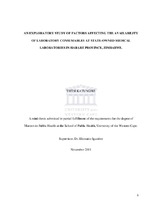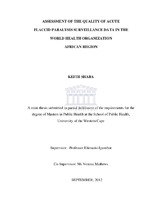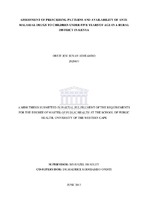| dc.description.abstract | The Zimbabwean government recognizes the critical role laboratories play in ensuring the health of the nation. Well-resourced and functioning laboratories are the sine qua non of effective diagnosis, treatment and clinical monitoring of medical problems such as HIV/AIDS, tuberculosis and malaria. In Zimbabwe, frequent unavailability of essential laboratory reagents and consumables have been reported but less well-reported are the factors associated with these "stockouts" at medical laboratories. Applying qualitative research methodologies, this study sought to explore the bottlenecks to the availability of laboratory consumables at state-owned medical laboratories in Harare Province. Semi-structured interviews were used to elicit stakeholders' perspectives and experiences with regard to the availability of laboratory consumables. These were complemented by observation of procurement, supply and distribution processes and individual follow-up interviews in 7 facilities where medical laboratory scientists were purposively selected. Rigour was ensured through data-source triangulation, provision of thick descriptions of the setting, maintaining an audit trail and transcribing data verbatim. Data analysis identified recurring themes and key suggestions made by respondents. A complex web of economic, human resources and supply chain factors affect laboratory commodity availability in Harare. Salient factors negatively affecting commodity availability included inadequate funding, human resources, poor communication and coordination among stakeholders, lack of transport, long lead times and limited inventory management skills. A comprehensive approach to resolving the challenge is warranted through advocating for more funding, complementing donor efforts on staff retention, improved coordination and collaboration among stakeholders and re-designing the laboratory supply chain. Further research would assist in determining ways of efficiently utilizing the limited available resources. | en_US |




